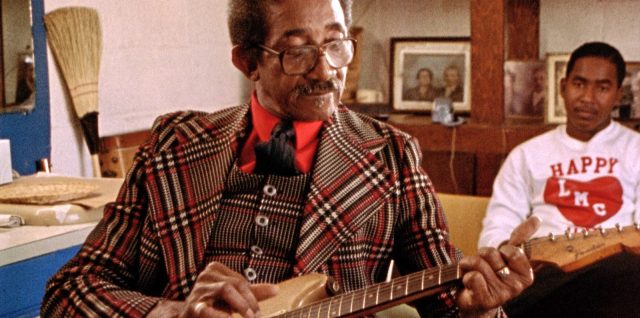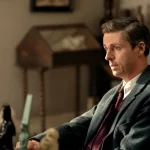Deep Blues: Goin’ Down South, by David Bax

Easily the biggest problem with far too many of today’s music documentaries is that they don’t have enough music. Or they do but they let their windbag talking head interviewees pontificate over it, self-defeatingly turning the very reason for the documentary into so much background noise to complement various egos. Robert Mugge’s 1992 Deep Blues, recently restored and available now in virtual cinemas (in addition to some theatrical dates), knows how to do it right. Every musician encountered in this survey of the delta blues scene plays at least one full, uninterrupted song. Sometimes we get two, in cases where the music is so good that Mugge and his collaborators seemingly just couldn’t bring themselves to turn the camera off.
One of the bluesmen we get to see play is R.L. Burnside, filmed picking and singing on his own front porch. Burnside is the only musician covered in Deep Blues of whom I was previously aware, thanks to his 1996 album A Ass Pocket of Whiskey, recorded with the Jon Spencer Blues Explosion and released when I was of exactly the right age and temperament to eat that sort of thing up. The show Burnside puts on in Deep Blues is at least partly responsible for bringing him and Spencer together.
We don’t spend more than ten minutes with any one musician, though. The only constant presence is our narrator and on-screen tour guide, Robert Palmer. No, not the “Addicted to Love” and “Simply Irresistible” guy but rather the blues music scholar and writer for, among others, Rolling Stone and the New York Times. Palmer is knowledgeable, passionate and, most of all, charming, not least because of his accent, so thick and dripping that, if a northerner talked that way, they’d be accused of stereotypical exaggeration.
Our other companion is Dave Stewart from the Eurythmics, a big fan of delta blues eager to learn more and see where the music comes from in person. So, yes, it should be acknowledged that Deep Blues is a movie in which a couple of white guys teach us about the blues.
But luckily, they don’t try to pretend that this music is something they discovered or to project their own assumptions and points of view onto it. Mugge (another white guy) lets the delta blues and those who play it speak for themselves, both with their words and their songs. Though Palmer does give us some background on things like juke joints and old Beale Street, Deep Blues reminds us that it’s not a movie about the history of delta blues but rather about its tradition, one that has never gone away.



























